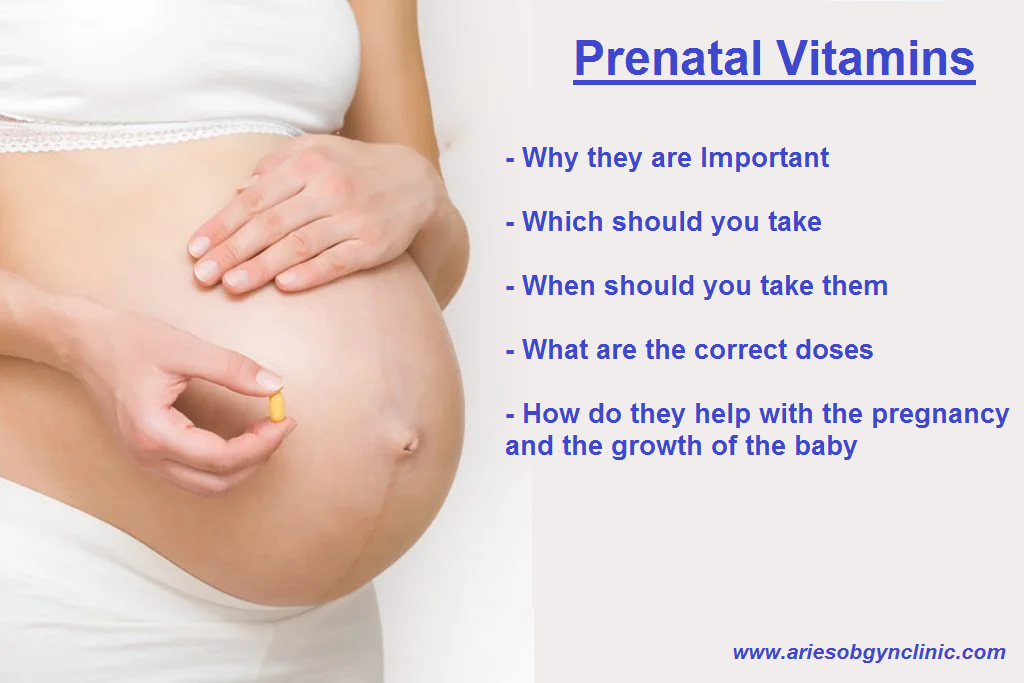Prenatal vitamins play an important role in ensuring that both you and your baby get the nutrients you need. While a good balanced diet can also provide adequate nutrients, it is necessary to take prenatal vitamin supplements to prevent any deficiency.
Why Are Prenatal Vitamins Important?
During pregnancy, your body undergoes numerous changes to support your growing baby. The nutritional demands increase, and while a balanced diet is key, prenatal vitamins help fill in any gaps. They ensure you receive the right amounts of essential nutrients, supporting both your health and the baby’s development.
Prenatal vitamins contain a range of vitamins and minerals, each playing a unique role in the baby’s growth and your well-being. Let’s take a look at some of the most important ones.
Important Prenatal Nutrients
Here’s a list of key vitamins and supplements found in prenatal vitamins, why they’re essential, and the recommended daily doses during pregnancy. These dosage may vary depending on individual needs, so it’s always best to consult with your healthcare provider.
Folic Acid (Vitamin B9)
- Daily Dose: 400-600 micrograms (mcg)
- Why It’s Important: Folic acid is crucial during the first trimester, even before many women know they’re pregnant. It helps form the neural tube, which later becomes the brain and spinal cord, reducing the risk of neural tube defects like spina bifida.
- How It Helps Your Baby: Folic acid supports healthy brain and spinal cord development, essential for your baby’s nervous system.
Iron
- Daily Dose: 27 milligrams (mg)
- Why It’s Important: Iron is vital for making hemoglobin, the protein in red blood cells that carries oxygen throughout the body. During pregnancy, your blood volume increases, so you need extra iron to support this increased blood supply.
- How It Helps Your Baby: Adequate iron helps deliver enough oxygen to your baby and lowers the risk of preterm delivery and low birth weight.
Calcium
- Daily Dose: 1,000 milligrams (mg)
- Why It’s Important: Calcium helps build your baby’s bones, teeth, heart, muscles, and nerves. During pregnancy, if your intake of calcium is too low, your body will take calcium from your bones to supply it to your baby.
- How It Helps Your Baby: Calcium supports the development of strong bones and teeth and helps maintain your bone density too.
Vitamin D
- Daily Dose: 600 international units (IU)
- Why It’s Important: Vitamin D works hand-in-hand with calcium to help build your baby’s bones and teeth. It also supports the immune system.
- How It Helps Your Baby: Adequate vitamin D levels help prevent complications like low birth weight and improve your baby’s overall growth.
Vitamin A
- Daily Dose: 770 micrograms (mcg) (retinol activity equivalents)
- Why It’s Important: Vitamin A supports cell growth, eye health, and immune function. However, too much vitamin A, especially in the form of retinoids, can be harmful, so it’s essential to stick to recommended doses.
- How It Helps Your Baby: Vitamin A aids in developing your baby’s eyes, skin, and immune system, contributing to overall healthy growth.
Iodine
- Daily Dose: 220 micrograms (mcg)
- Why It’s Important: Iodine is crucial for thyroid hormone production, which is vital for your baby’s brain and nervous system development.
- How It Helps Your Baby: Sufficient iodine levels are necessary for brain development, reducing the risk of cognitive and developmental delays.
Omega-3 Fatty Acids (DHA and EPA)
- Daily Dose: 200-300 milligrams (mg) of DHA
- Why It’s Important: Omega-3 fatty acids, particularly DHA, play an important role in brain and eye development. They also support the formation of cell membranes.
- How It Helps Your Baby: DHA is particularly critical for brain and retinal development, helping to lay the foundation for cognitive function and vision.
Vitamin B6
- Daily Dose: 1.9 milligrams (mg)
- Why It’s Important: Vitamin B6 supports brain development and function and may also help alleviate nausea in early pregnancy.
- How It Helps Your Baby: B6 helps with brain development and may help you feel better by reducing morning sickness.
Vitamin B12
- Daily Dose: 2.6 micrograms (mcg)
- Why It’s Important: Vitamin B12 works closely with folic acid to help with the formation of red blood cells and DNA synthesis.
- How It Helps Your Baby: It supports nervous system development and reduces the risk of neural tube defects.
Zinc
- Daily Dose: 11 milligrams (mg)
- Why It’s Important: Zinc supports cell growth and helps boost your immune system, making it a crucial mineral during pregnancy.
- How It Helps Your Baby: Zinc helps with tissue growth and development and supports a healthy immune system.
Vitamin C
- Daily Dose: 85 milligrams (mg)
- Why It’s Important: Vitamin C supports your immune system and helps your body absorb iron more efficiently. It also plays a role in the development of your baby’s bones, teeth, and connective tissues.
- How It Helps Your Baby: Vitamin C supports tissue growth and helps maintain a strong immune system.
- Choosing the Right Prenatal Vitamin
When selecting a prenatal vitamin, make sure it contains all these essential nutrients at the recommended levels. Some prenatal vitamins may have higher doses of specific vitamins, while others might need a little supplementation. Here are a few tips:
- Check Iron Content: Not all prenatals contain the recommended amount of iron. If yours is low, consider taking an additional iron supplement.
- Consider DHA and Omega-3s: Not all prenatal vitamins contain DHA, so you may need a separate supplement to meet the daily recommendation.
- Avoid Excess Vitamin A: Choose a prenatal vitamin that contains beta-carotene as the source of vitamin A instead of retinol, as high doses of retinol can be harmful.
- Timing and Consistency
Try to take your prenatal vitamin at the same time every day, ideally with food. Some vitamins, like iron, can cause mild stomach upset, so taking it with food can help. The best time to start taking a prenatal vitamin is ideally before conception, but if you’re already pregnant, starting now will still benefit both you and your baby.
- A Few Final Thoughts on Prenatal Health
Prenatal vitamins are an excellent way to ensure you’re meeting your nutritional needs during pregnancy, but they’re not a substitute for a balanced diet. Eating a variety of whole foods rich in fruits, vegetables, lean proteins, whole grains, and healthy fats will provide the foundation for a healthy pregnancy.




